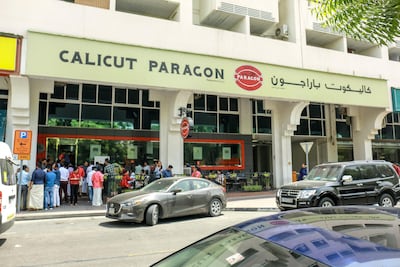In a new series, we talk to UAE food institutions that have been serving customers for decades about these unprecedented times ...
If you’re looking for authentic South Indian food in Dubai, chances are, Calicut Paragon, with branches in Karama and Al Nahda, has been recommended as the place to go.
The restaurant was started in 1939 by Govindan Panhikeyil and his son, PM Valsan, in Kerala, India, and opened its first branch in Dubai in 2005. Now handled by the third generation, Sumesh Govind and his wife, Liju, the restaurant is one of Dubai’s best-loved spots for authentic South Indian fare – whether its fish moilee (a curry made with coconut milk), a thali or a cup of filter coffee.
“Growing up, I always heard stories about my grandfather. He was adamant about quality and hygiene – he wanted everything to be perfect,” says Govind, who got into the family business 35 years ago when he was only 21 years old. “We would always go that extra length to bring something new to the customer. And we cater to the masses. We were never trying to be a fine-dining restaurant.
“Business was perfect. We were doing really well. But the coronavirus pandemic has been a complex issue that has taken the world by surprise. Now we are just trying to find ways to survive.”

With restaurants closed to dine-in customers for much of April, and more people eschewing outside food in favour of home-cooked meals, the food and beverage sector has been one of the worst affected amid the pandemic. Even restaurants such as Calicut Paragon, with its strong fan base and long history, have been hard hit.
According to Govind, the restaurant has made roughly 15 to 20 per cent of its usual sales over the past two months. In other words, it has been making a huge loss. Even as restrictions are being eased and restaurants are allowed to seat dine-in customers again (at a 30 per cent capacity), it still has not helped too much, he says.
“Running a restaurant is a labour-intensive business. It's not a 9-to-5 job. Moreover, we have a staff of about 100 right now, and overheads that are huge. Business needs to go up. If things carry on the way they are, more than 50 per cent of restaurants in Dubai – at least in the Keralite community – will go broke,” he says.
Calicut Paragon has always been known for its ability to innovate, says Govind, who believes that this is the only way restaurants will be able to survive, going forward. “About 12 years ago, we noticed that there was a worldwide trend towards healthier food. At that time, we looked at the Kerala paratha and thought, 'Why can’t we make this, but with wholewheat flour instead?' It took a lot of experimentation. We finally found a way to get the right percentage of wholewheat and minimal white flour that needed to be added to create the dish without compromising on quality, and it was a hit. Now there are many restaurants serving the same dish,” says Govind. It is this need to constantly innovate that he is bringing with him as the restaurant struggles to cope with the pandemic.

“Every situation demands something. Right now, it is all about going that extra mile, thinking about hygiene and about nutrition. We want to serve dishes to our customers that might contribute to someone’s health in a positive way,” says Govind.
In order to adapt to the current situation, the restaurant has launched a new healthy menu. It has also taken to making an immunity-boosting soup, served complimentary to customers. Other than that, the restaurant is adapting by cooking food in small batches and having all of its food served within four hours of preparation. Govind hopes this will help.
“It’s hard when you are so passionate about something and you see everything turn upside down,” he says. “The restaurant business can be unpredictable – but at the same time it is an industry that helps some of the most downtrodden people in the world. Those working for this sector know that you can hire people who otherwise don’t have educational qualifications, teach them how to be a waiter or assistant to the cook, and within two years they can climb the ladder. That’s what is making me hold on. Just by being in this industry, we are able to touch the lives of so many people.”



